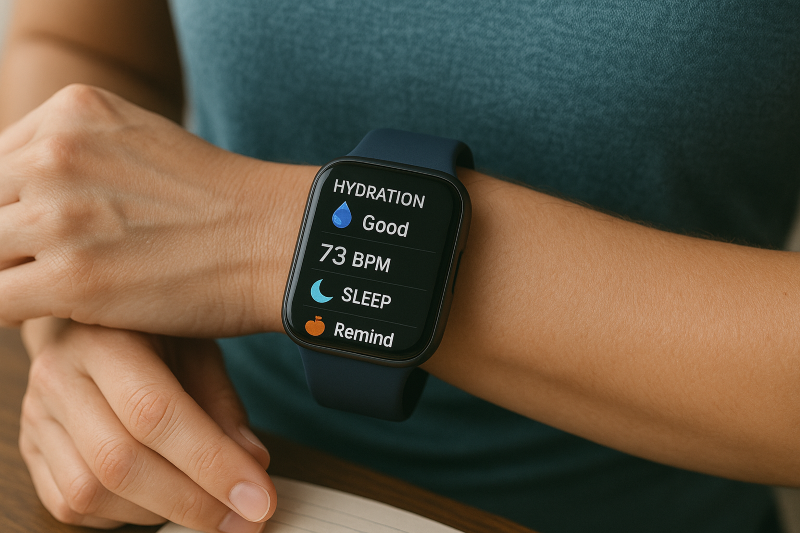
Wearable Technology for Post-Bariatric Monitoring: Beyond Step Counting
Share
Bariatric surgery has become an increasingly popular and effective solution for individuals struggling with severe obesity. These life-changing procedures not only help patients achieve significant weight loss but also improve their overall health and quality of life. However, the journey doesn't end with the surgery itself. Maintaining optimal health and well-being in the post-operative period is crucial for long-term success.
Traditionally, post-bariatric health monitoring has relied on periodic check-ups, self-reporting, and basic fitness tracking. While these methods provide some insights, they often fall short in delivering the comprehensive data needed to truly understand an individual's unique health status and recovery progress. This is where the evolution of wearable technology has opened up new possibilities for bariatric patients.
The Limitations of Traditional Monitoring
Bariatric surgery is a complex process that requires lifelong monitoring of nutritional intake, physical activity, and metabolic health. However, traditional tools such as self-reporting or periodic lab tests may miss subtle warning signs of nutrient deficiencies or dehydration【PubMed†1】. Basic step counters and fitness trackers lack the sophistication to monitor micronutrient levels, protein absorption, or hydration needs that are essential for post-operative patients【ASMBS†2】.
The Rise of Advanced Wearable Tech
Fitness Trackers with Bariatric-Specific Metrics
Modern wearable devices can now measure much more than just steps. Smartwatches and fitness bands can track resting heart rate, stress levels, calorie expenditure, and even trends in oxygen saturation—metrics that correlate with early signs of nutrient deficiencies and cardiovascular stress in post-bariatric patients【NIH†3】.
Smartwatches for Hydration Tracking
Hydration is a cornerstone of post-surgical recovery. Even mild dehydration can lead to fatigue, dizziness, and complications like kidney stones【Mayo Clinic†4】. Some smartwatches now incorporate hydration reminders based on activity level and environmental conditions, improving fluid management for bariatric individuals.
Nutrition and Metabolism Monitoring Devices
Emerging metabolic monitors such as biosensor patches and continuous glucose monitors are helping track nutrient metabolism and glycemic response. This is especially valuable for gastric bypass patients, who are at higher risk for dumping syndrome and hypoglycemia【The Lancet Diabetes & Endocrinology†5】.
The Benefits of Wearable Technology in Bariatric Care
Early Detection of Potential Health Issues
Wearables can provide continuous, real-time data, alerting users and clinicians to early signs of nutritional deficiencies (e.g., iron, vitamin B12) or abnormal heart rate variability—markers of metabolic stress【Journal of Medical Internet Research†6】.
Increased Motivation and Engagement
Studies show that real-time feedback via wearable technology can significantly improve adherence to diet, exercise, and supplementation regimens in bariatric patients【Obesity Surgery Journal†7】.
Personalized Health Management
By integrating wearable data into electronic health records (EHRs), care teams can tailor supplementation, diet modifications, and physical activity plans to each patient’s unique physiology【PubMed Central†8】.
The Future of Wearable Technology in Bariatric Care
Wearables powered by artificial intelligence (AI) are being developed to forecast nutrient needs, optimize meal timing, and alert users to abnormal patterns in hydration or metabolic function. Future integration with telehealth platforms may allow surgeons and dietitians to remotely monitor recovery and intervene proactively【NEJM Digital Medicine†9】.
Custom wearables designed for bariatric populations—featuring enhanced biosensors, adaptive interfaces, and nutrient-specific alerts—are already in development. These innovations may soon become the gold standard in post-bariatric recovery and long-term care.
Conclusion
The journey of bariatric surgery is not just about the procedure—it’s about long-term adaptation and empowered self-monitoring. Wearable technology bridges the gap between clinic and home, enabling more proactive, personalized, and precise post-operative care. By embracing these tools, patients can improve outcomes, reduce complications, and build a stronger foundation for lifelong metabolic health.
Sources
- PubMed: Nutritional management after bariatric surgery
- ASMBS: Guidelines for the perioperative support of bariatric surgery patients
- NIH: Use of wearable sensors to monitor physical activity in obesity
- Mayo Clinic: Dehydration after bariatric surgery
- The Lancet Diabetes & Endocrinology: Hypoglycemia after gastric bypass
- JMIR: Effect of wearables on long-term adherence to weight loss
- Obesity Surgery Journal: Wearable activity trackers in bariatric surgery
- PubMed Central: Monitoring nutrition with digital health tools
- NEJM Digital Medicine: Personalized remote patient monitoring
